|
Books Should Be Free Loyal Books Free Public Domain Audiobooks & eBook Downloads |
|
|
Books Should Be Free Loyal Books Free Public Domain Audiobooks & eBook Downloads |
|
Top Authors |
|---|
|
Book type:
Sort by:
|
By: Alan Edward Nourse (1928-1992) | |
|---|---|
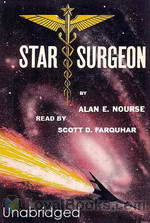 Star Surgeon
Star Surgeon
A thrilling intergalactic adventure, Star Surgeon follows the journey of Dal Timgar as he strives to achieve his lifelong goal of becoming a physician. Published in 1959, the novel explores themes of discrimination, prejudice, and racial oppression, while also presenting key elements of science fiction including interplanetary travel, intergalactic medicine, aliens, and advanced technology. The thrilling tale begins with the introduction of Dal Timgar, a young alien from Garv, who has aspired to become a doctor for as long as he can remember... | |
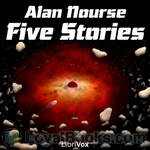 Five Stories by Alan Nourse
Five Stories by Alan Nourse
These Five Stories were written by Alan Edward Nourse, an American science fiction (SF) author and physician. He wrote both juvenile and adult science fiction, as well as nonfiction works about medicine and science. His SF works generally focused on medicine and/or psionics. Psionics refers to the practice, study, or psychic ability of using the mind to induce paranormal phenomena. Examples of this include telepathy, telekinesis, and other workings of the outside world through the psyche. | |
 Derelict
Derelict
| |
 Bear Trap
Bear Trap
| |
 An Ounce of Cure
An Ounce of Cure
| |
 Image of the Gods
Image of the Gods
| |
 Contamination Crew
Contamination Crew
| |
 My Friend Bobby
My Friend Bobby
| |
 The Dark Door
The Dark Door
| |
 Second Sight
Second Sight
| |
 The Native Soil
The Native Soil
| |
 Letter of the Law
Letter of the Law
| |
 The Coffin Cure
The Coffin Cure
| |
 Circus
Circus
| |
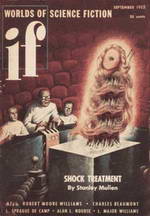 Marley's Chain
Marley's Chain
| |
 Meeting of the Board
Meeting of the Board
| |
 Infinite Intruder
Infinite Intruder
| |
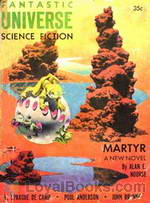 Martyr
Martyr
| |
 PRoblem
PRoblem
| |
 The Link
The Link
| |
By: Alan Gray (1857-1934) | |
|---|---|
 Gentle Persuasion
Gentle Persuasion
Twelve stories from the author's life in Scotland, by Robert Cuthbert Johnstone, writing as Alan Gray. For more information on the author see his biography by the Manitoba Historical Society. | |
By: Alan L. Strang | |
|---|---|
 Our Boys and Other Poems
Our Boys and Other Poems
| |
By: Alan Mattox | |
|---|---|
 Shepherd of the Planets
Shepherd of the Planets
| |
By: Alan Sullivan (1868-1947) | |
|---|---|
 The Rapids
The Rapids
| |
By: Alan [Editor] Story | |
|---|---|
 The Copy/South Dossier Issues in the economics, politics, and ideology of copyright in the global South
The Copy/South Dossier Issues in the economics, politics, and ideology of copyright in the global South
| |
By: Alanson M. Randol | |
|---|---|
 Last Days of the Rebellion The Second New York Cavalry (Harris' Light) at Appomattox Station and Appomattox Court House, April 8 and 9, 1865
Last Days of the Rebellion The Second New York Cavalry (Harris' Light) at Appomattox Station and Appomattox Court House, April 8 and 9, 1865
| |
By: Alban Butler (1711-1773) | |
|---|---|
 The Lives of the Fathers, Martyrs, and Principal Saints January, February, March
The Lives of the Fathers, Martyrs, and Principal Saints January, February, March
| |
By: Albert A. Michelson (1852-1931) | |
|---|---|
 Experimental Determination of the Velocity of Light Made at the U.S. Naval Academy, Annapolis
Experimental Determination of the Velocity of Light Made at the U.S. Naval Academy, Annapolis
| |
By: Albert Bigelow Pain | |
|---|---|
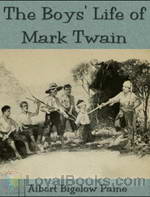 The Boys' Life of Mark Twain
The Boys' Life of Mark Twain
Albert Bigelow Paine was Samuel Langhorne Clemens’ (Mark Twain’s) biographer. He lived with Twain, collecting ideas and material for a biography, for a few years before Twain’s death in 1910. Six years later Paine published this “story of a man who made the world laugh and love him.” For those who have read or listened to Mark Twain’s works, Paine’s work is an invaluable resource to better understand Twain, the stories behind his stories and his life with those he loved and with whom he worked. | |
By: Albert Bigelow Paine (1861-1937) | |
|---|---|
 The Hollow Tree Snowed-In
The Hollow Tree Snowed-In
| |
 Dwellers in Arcady The Story of an Abandoned Farm
Dwellers in Arcady The Story of an Abandoned Farm
| |
 Hollow Tree Nights and Days
Hollow Tree Nights and Days
| |
 The Tent Dwellers
The Tent Dwellers
| |
 The Car That Went Abroad Motoring Through the Golden Age
The Car That Went Abroad Motoring Through the Golden Age
| |
 The Autobiography of a Monkey
The Autobiography of a Monkey
| |
 The Arkansaw Bear A Tale of Fanciful Adventure
The Arkansaw Bear A Tale of Fanciful Adventure
| |
 Mr. Rabbit's Wedding Hollow Tree Stories
Mr. Rabbit's Wedding Hollow Tree Stories
| |
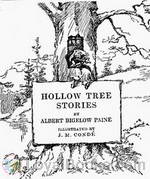 Making Up with Mr. Dog Hollow Tree Stories
Making Up with Mr. Dog Hollow Tree Stories
| |
 The Van Dwellers A Strenuous Quest for a Home
The Van Dwellers A Strenuous Quest for a Home
| |
 The Bread Line A Story of a Paper
The Bread Line A Story of a Paper
| |
 The Ship Dwellers A Story of a Happy Cruise
The Ship Dwellers A Story of a Happy Cruise
| |
 Mr. Turtle's Flying Adventure Hollow Tree Stories
Mr. Turtle's Flying Adventure Hollow Tree Stories
| |
 The Mystery of Evelin Delorme A Hypnotic Story
The Mystery of Evelin Delorme A Hypnotic Story
| |
 Life and Lillian Gish
Life and Lillian Gish
An authorized biography of Lillian Gish, the renowned silent film star known in her heyday as the First Lady of American Cinema. Albert Bigelow Paine chronicles Gish's early life, her close relationship with her sister Dorothy, her rise in film as an actor with Biograph Studios and muse of D. W. Griffith, her short time as a contract actor with MGM, and her return to the stage in the advent of the talkies. Peppered throughout with intimate and amusing anecdotes, this is a must-read for film historians, silent film enthusiasts, and admirers of one of cinema's legendary talents. | |
 Mark Twain: A Biography - Volume 1
Mark Twain: A Biography - Volume 1
Until recently, this work has been considered the "go-to" bio of Mark Twain. Albert Bigelow Paine was an American author and biographer best known for his work with Mark Twain. This recording of Paine's exhaustive biography covers Twain's personal and literary life in detail, heretofore unapproached. - Summary by John Greenman and Wikipedia | |
 Mark Twain: A Biography - Volume III
Mark Twain: A Biography - Volume III
This work has been considered the "go-to" bio of Mark Twain for over a hundred years. Albert Bigelow Paine was an American author and biographer best known for his work with Mark Twain. These recordings of Paine's exhaustive biography cover Twain's personal and literary life in detail, heretofore, unapproached. The published work is divided into 7 sections, on three separate recordings: Recording #1 -VOLUME I, Part 1: 1835-1866 -VOLUME I, Part 2: 1866-1875 Recording #2 -VOLUME II, Part 1: 1875-1886 -VOLUME II, Part 2: 1886-1900 Recording #3 -VOLUME III, Part 1: 1900-1907 -VOLUME III, Part 2: 1907-1910 -Appendixes | |
 Moments With Mark Twain
Moments With Mark Twain
These selections from the works of Mark Twain are presented in chronological order. They include the memorable whitewashing of the fence in "Tom Sawyer", events preceding the Mississippi River raft journey in "Huckleberry Finn", a dark moment during the exchange of identities in “The Prince and the Pauper”, and reflections of “A Connecticut Yankee in King Arthur’s Court”. A critic wrote of another excerpt concerning a feud, "...as dramatic and powerful an episode as I know in modern literature." Also included are comments about travel abroad, Joan of Arc, a generous helping of Twain’s renowned quips, and mortality. | |
 Captain Bill McDonald, Texas Ranger: A Story of Frontier Reform
Captain Bill McDonald, Texas Ranger: A Story of Frontier Reform
"William Jesse "Bill" McDonald in the 1880s served as a deputy sheriff in Wood County. After moving to Hardeman County, he served as deputy sheriff, special Ranger, and U. S. Deputy Marshal of the Northern District of Texas and the Southern District of Kansas.. . . .In 1891 McDonald was selected to replace S. A. McMurry as Captain of Company B, Frontier Battalion. He served as a Ranger captain until 1907. Capt. McDonald and his company took part in a number of celebrated cases including the Fitzsimmons-Maher prize fight, the Wichita Falls bank robbery, the Reese-Townsend feud, and the Brownsville Raid of 1906... | |
By: Albert Burton Farnham (1870-) | |
|---|---|
 Home Taxidermy for Pleasure and Profit A Guide for Those Who Wish to Prepare and Mount Animals, Birds, Fish, Reptiles, etc., for Home, Den, or Office Decoration
Home Taxidermy for Pleasure and Profit A Guide for Those Who Wish to Prepare and Mount Animals, Birds, Fish, Reptiles, etc., for Home, Den, or Office Decoration
| |
By: Albert Bushnell Hart (1854-1943) | |
|---|---|
 The Mentor: The War of 1812 Volume 4, Number 3, Serial Number 103; 15 March, 1916.
The Mentor: The War of 1812 Volume 4, Number 3, Serial Number 103; 15 March, 1916.
| |
 Formation of the Union, 1750-1829
Formation of the Union, 1750-1829
| |
By: Albert C. Manucy | |
|---|---|
 Artillery Through the Ages A Short Illustrated History of Cannon, Emphasizing Types Used in America
Artillery Through the Ages A Short Illustrated History of Cannon, Emphasizing Types Used in America
| |
By: Albert Christopher Addison | |
|---|---|
 The Romantic Story of the Mayflower Pilgrims And Its Place in the Life of To-day
The Romantic Story of the Mayflower Pilgrims And Its Place in the Life of To-day
| |
By: Albert D. Vandam | |
|---|---|
 Bartholomew Sastrow Being the Memoirs of a German Burgomaster
Bartholomew Sastrow Being the Memoirs of a German Burgomaster
| |
By: Albert Dresden Vandam (1843-1903) | |
|---|---|
 An Englishman in Paris Notes and Recollections
An Englishman in Paris Notes and Recollections
| |
By: Albert Eberhard Friedrich Schäffle (1831-1903) | |
|---|---|
 The Theory and Policy of Labour Protection
The Theory and Policy of Labour Protection
| |
By: Albert Einstein (1879-1955) | |
|---|---|
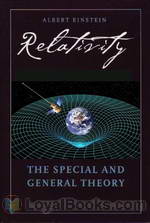 Relativity: The Special and General Theory
Relativity: The Special and General Theory
Einstein wrote this book for people who are interested in understanding the Theory of Relativity but aren't experts in scientific and mathematical principles. I'm sure many people have heard about Einstein's Theory of Relativity, but most of them don't really know what it is all about. This book gives them a chance to know more about this very famous theory without the need to take a Physics course first. This book is divided into three parts. The first part explains what special relativity is all about... | |
 Sidelights on Relativity
Sidelights on Relativity
Sidelights on Relativity contains ETHER AND THE THEORY OF RELATIVITY, an address delivered on May 5th, 1920, in the University of Leyden; and GEOMETRY AND EXPERIENCE, an expanded form of an address to the Prussian Academy of Sciences in Berlin on January 27th, 1921. (Intro from Project Gutenberg) | |
 The Meaning of Relativity Four lectures delivered at Princeton University, May, 1921
The Meaning of Relativity Four lectures delivered at Princeton University, May, 1921
| |
 Relativity: The Special and the General Theory A Popular Exposition, 3rd ed.
Relativity: The Special and the General Theory A Popular Exposition, 3rd ed.
| |
By: Albert Ernest Jenks | |
|---|---|
 The Bontoc Igorot
The Bontoc Igorot
The Bontoc Igorotby Albert Ernest JenksPREFACEAfter an expedition of two months in September, October, and November, 1902, among the people of northern Luzon it was decided that the Igorot of Bontoc pueblo, in the Province of Lepanto-Bontoc, are as typical of the primitive mountain agriculturist of Luzon as any group visited, and that ethnologic investigations directed from Bontoc pueblo would enable the investigator to show the culture of the primitive mountaineer of Luzon as well as or better than investigations centered elsewhere... | |
By: Albert F. Blaisdell | |
|---|---|
 A Practical Physiology
A Practical Physiology
| |
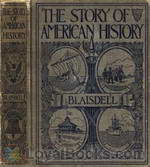 The Story of American History For Elementary Schools
The Story of American History For Elementary Schools
| |
By: Albert Frederick Siepert (1883-) | |
|---|---|
 Bird Houses Boys Can Build
Bird Houses Boys Can Build
| |
By: Albert G. (Albert Gardner) Robinson (1855-1932) | |
|---|---|
 Cuba, Old and New
Cuba, Old and New
| |
By: Albert G. Mackey | |
|---|---|
 The Principles of Masonic Law A Treatise on the Constitutional Laws, Usages and Landmarks of Freemasonry
The Principles of Masonic Law A Treatise on the Constitutional Laws, Usages and Landmarks of Freemasonry
| |
 The Symbolism of Freemasonry
The Symbolism of Freemasonry
| |
By: Albert Gallatin (1761-1849) | |
|---|---|
 Peace with Mexico
Peace with Mexico
| |
By: Albert H. Benson | |
|---|---|
 Fruits of Queensland
Fruits of Queensland
| |
By: Albert Hale Plumb | |
|---|---|
 William Bradford of Plymouth
William Bradford of Plymouth
| |
By: Albert Henry Smyth (1863-1907) | |
|---|---|
 The Philadelphia Magazines and their Contributors 1741-1850
The Philadelphia Magazines and their Contributors 1741-1850
| |
By: Albert Hernhuter | |
|---|---|
 Texas Week
Texas Week
| |
 The Smiler
The Smiler
| |
By: Albert James Pickett | |
|---|---|
 Eight days in New Orleans in February, 1847
Eight days in New Orleans in February, 1847
| |
By: Albert Jeremiah Beveridge (1862-1927) | |
|---|---|
 The Young Man and the World
The Young Man and the World
| |
By: Albert Keim (1876-1947) | |
|---|---|
 Honore de Balzac
Honore de Balzac
| |
By: Albert Leffingwell (1845-1916) | |
|---|---|
 Vivisection
Vivisection
| |
 An Ethical Problem Or, Sidelights upon Scientific Experimentation on Man and Animals
An Ethical Problem Or, Sidelights upon Scientific Experimentation on Man and Animals
| |
By: Albert M. Goodrich | |
|---|---|
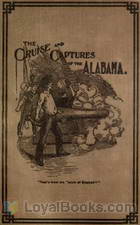 Cruise and Captures of the Alabama
Cruise and Captures of the Alabama
| |
By: Albert Moll (1862-1939) | |
|---|---|
 The Sexual Life of the Child
The Sexual Life of the Child
| |
By: Albert Mordell (1885-) | |
|---|---|
 The Literature of Ecstasy
The Literature of Ecstasy
| |
By: Albert Parker Fitch | |
|---|---|
 Preaching and Paganism
Preaching and Paganism
| |
By: Albert Payson Terhune (1872-1942) | |
|---|---|
 His Dog
His Dog
Albert Payson Terhune, perhaps best known for his book Lad, a Dog (later turned into a popular movie), was also a breeder of collies and a journalist. Some of his collie lines survive to this day. His Dog is a story about Link Ferris who finds an injured dog on his way home one evening. Knowing nothing about dogs, Link nurses the dog back to health and the two form a bond such as only can be formed between human and canine. Unable to locate the collie’s owner, Link christens his dog ‘Chum’ who becomes invaluable in tending to the daily needs of his meager farm... | |
 Further Adventures of Lad
Further Adventures of Lad
| |
 Black Caesar's Clan : a Florida Mystery Story
Black Caesar's Clan : a Florida Mystery Story
| |
By: Albert Pfister (1839-1907) | |
|---|---|
 The Voyage of The First Hessian Army from Portsmouth to New York, 1776
The Voyage of The First Hessian Army from Portsmouth to New York, 1776
| |
By: Albert Pike (1809-1891) | |
|---|---|
 Morals and Dogma of the Ancient and Accepted Scottish Rite of Freemasonry
Morals and Dogma of the Ancient and Accepted Scottish Rite of Freemasonry
| |
By: Albert Réville | |
|---|---|
 Lectures on the Origin and Growth of Religion as Illustrated by the Native Religions of Mexico and Peru
Lectures on the Origin and Growth of Religion as Illustrated by the Native Religions of Mexico and Peru
| |
By: Albert Rhys Williams (1883-1962) | |
|---|---|
 In the Claws of the German Eagle
In the Claws of the German Eagle
| |
By: Albert Robida (1848-1926) | |
|---|---|
 La Fin Des Livres
La Fin Des Livres
| |
By: Albert Shaw (1857-1947) | |
|---|---|
 The business career in its public relations
The business career in its public relations
| |
By: Albert Sidney Bolles | |
|---|---|
 Putnam's Handy Law Book for the Layman
Putnam's Handy Law Book for the Layman
| |
By: Albert Taylor Bledsoe (1809-1877) | |
|---|---|
 A Theodicy, or, Vindication of the Divine Glory
A Theodicy, or, Vindication of the Divine Glory
| |
 An Examination of President Edwards' Inquiry into the Freedom of the Will
An Examination of President Edwards' Inquiry into the Freedom of the Will
| |
By: Albert Teichner | |
|---|---|
 Cerebrum
Cerebrum
| |
 Man Made
Man Made
| |
 Sweet Their Blood and Sticky
Sweet Their Blood and Sticky
| |
 The Junkmakers
The Junkmakers
| |
By: Albert Venn Dicey (1835-1922) | |
|---|---|
 England's Case Against Home Rule
England's Case Against Home Rule
| |
 A Leap in the Dark A Criticism of the Principles of Home Rule as Illustrated by the Bill of 1893
A Leap in the Dark A Criticism of the Principles of Home Rule as Illustrated by the Bill of 1893
| |